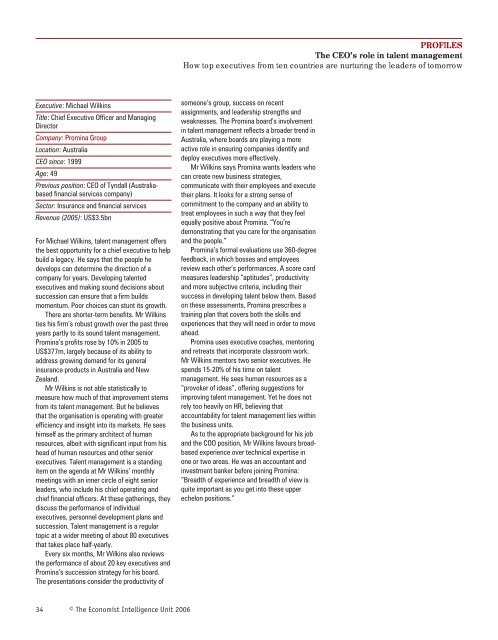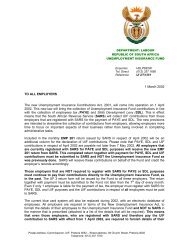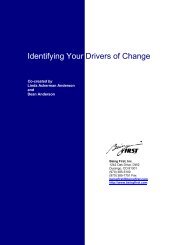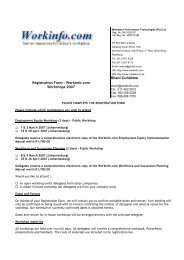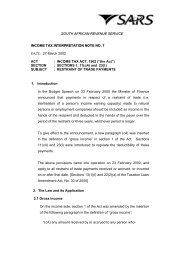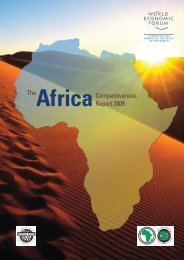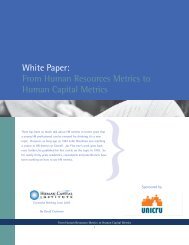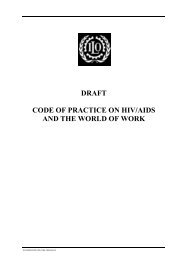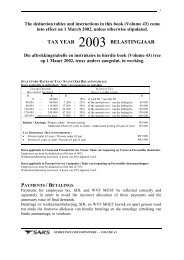The CEO's role in talent management - DDI
The CEO's role in talent management - DDI
The CEO's role in talent management - DDI
Create successful ePaper yourself
Turn your PDF publications into a flip-book with our unique Google optimized e-Paper software.
PROFILES<br />
<strong>The</strong> CEO’s <strong>role</strong> <strong>in</strong> <strong>talent</strong> <strong>management</strong><br />
How top executives from ten countries are nurtur<strong>in</strong>g the leaders of tomorrow<br />
Executive: Michael Wilk<strong>in</strong>s<br />
Title: Chief Executive Officer and Manag<strong>in</strong>g<br />
Director<br />
Company: Prom<strong>in</strong>a Group<br />
Location: Australia<br />
CEO s<strong>in</strong>ce: 1999<br />
Age: 49<br />
Previous position: CEO of Tyndall (Australiabased<br />
f<strong>in</strong>ancial services company)<br />
Sector: Insurance and f<strong>in</strong>ancial services<br />
Revenue (2005): US$3.5bn<br />
For Michael Wilk<strong>in</strong>s, <strong>talent</strong> <strong>management</strong> offers<br />
the best opportunity for a chief executive to help<br />
build a legacy. He says that the people he<br />
develops can determ<strong>in</strong>e the direction of a<br />
company for years. Develop<strong>in</strong>g <strong>talent</strong>ed<br />
executives and mak<strong>in</strong>g sound decisions about<br />
succession can ensure that a firm builds<br />
momentum. Poor choices can stunt its growth.<br />
<strong>The</strong>re are shorter-term benefits. Mr Wilk<strong>in</strong>s<br />
ties his firm’s robust growth over the past three<br />
years partly to its sound <strong>talent</strong> <strong>management</strong>.<br />
Prom<strong>in</strong>a’s profits rose by 10% <strong>in</strong> 2005 to<br />
US$377m, largely because of its ability to<br />
address grow<strong>in</strong>g demand for its general<br />
<strong>in</strong>surance products <strong>in</strong> Australia and New<br />
Zealand.<br />
Mr Wilk<strong>in</strong>s is not able statistically to<br />
measure how much of that improvement stems<br />
from its <strong>talent</strong> <strong>management</strong>. But he believes<br />
that the organisation is operat<strong>in</strong>g with greater<br />
efficiency and <strong>in</strong>sight <strong>in</strong>to its markets. He sees<br />
himself as the primary architect of human<br />
resources, albeit with significant <strong>in</strong>put from his<br />
head of human resources and other senior<br />
executives. Talent <strong>management</strong> is a stand<strong>in</strong>g<br />
item on the agenda at Mr Wilk<strong>in</strong>s’ monthly<br />
meet<strong>in</strong>gs with an <strong>in</strong>ner circle of eight senior<br />
leaders, who <strong>in</strong>clude his chief operat<strong>in</strong>g and<br />
chief f<strong>in</strong>ancial officers. At these gather<strong>in</strong>gs, they<br />
discuss the performance of <strong>in</strong>dividual<br />
executives, personnel development plans and<br />
succession. Talent <strong>management</strong> is a regular<br />
topic at a wider meet<strong>in</strong>g of about 80 executives<br />
that takes place half-yearly.<br />
Every six months, Mr Wilk<strong>in</strong>s also reviews<br />
the performance of about 20 key executives and<br />
Prom<strong>in</strong>a’s succession strategy for his board.<br />
<strong>The</strong> presentations consider the productivity of<br />
someone’s group, success on recent<br />
assignments, and leadership strengths and<br />
weaknesses. <strong>The</strong> Prom<strong>in</strong>a board’s <strong>in</strong>volvement<br />
<strong>in</strong> <strong>talent</strong> <strong>management</strong> reflects a broader trend <strong>in</strong><br />
Australia, where boards are play<strong>in</strong>g a more<br />
active <strong>role</strong> <strong>in</strong> ensur<strong>in</strong>g companies identify and<br />
deploy executives more effectively.<br />
Mr Wilk<strong>in</strong>s says Prom<strong>in</strong>a wants leaders who<br />
can create new bus<strong>in</strong>ess strategies,<br />
communicate with their employees and execute<br />
their plans. It looks for a strong sense of<br />
commitment to the company and an ability to<br />
treat employees <strong>in</strong> such a way that they feel<br />
equally positive about Prom<strong>in</strong>a. “You’re<br />
demonstrat<strong>in</strong>g that you care for the organisation<br />
and the people.”<br />
Prom<strong>in</strong>a’s formal evaluations use 360-degree<br />
feedback, <strong>in</strong> which bosses and employees<br />
review each other’s performances. A score card<br />
measures leadership “aptitudes”, productivity<br />
and more subjective criteria, <strong>in</strong>clud<strong>in</strong>g their<br />
success <strong>in</strong> develop<strong>in</strong>g <strong>talent</strong> below them. Based<br />
on these assessments, Prom<strong>in</strong>a prescribes a<br />
tra<strong>in</strong><strong>in</strong>g plan that covers both the skills and<br />
experiences that they will need <strong>in</strong> order to move<br />
ahead.<br />
Prom<strong>in</strong>a uses executive coaches, mentor<strong>in</strong>g<br />
and retreats that <strong>in</strong>corporate classroom work.<br />
Mr Wilk<strong>in</strong>s mentors two senior executives. He<br />
spends 15-20% of his time on <strong>talent</strong><br />
<strong>management</strong>. He sees human resources as a<br />
“provoker of ideas”, offer<strong>in</strong>g suggestions for<br />
improv<strong>in</strong>g <strong>talent</strong> <strong>management</strong>. Yet he does not<br />
rely too heavily on HR, believ<strong>in</strong>g that<br />
accountability for <strong>talent</strong> <strong>management</strong> lies with<strong>in</strong><br />
the bus<strong>in</strong>ess units.<br />
As to the appropriate background for his job<br />
and the COO position, Mr Wilk<strong>in</strong>s favours broadbased<br />
experience over technical expertise <strong>in</strong><br />
one or two areas. He was an accountant and<br />
<strong>in</strong>vestment banker before jo<strong>in</strong><strong>in</strong>g Prom<strong>in</strong>a:<br />
“Breadth of experience and breadth of view is<br />
quite important as you get <strong>in</strong>to these upper<br />
echelon positions.”<br />
34 © <strong>The</strong> Economist Intelligence Unit 2006


